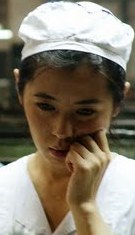Weaving
Girl played at the 2009
Montreal World Film Festival. For the ratings, click
HERE.
Darcy Paquet is a film reviewer at www.screendaily.com.
For more on cinema, visit his homepage:http://koreanfilm.org
Director Wang Quanan’s
follow-up to Tuya’s Marriage, which unexpectedly
took home the 2007 Berlin Golden Bear, Weaving Girl
was bypassed by top festivals but could have an interesting
second life as a specialty release. Although it initially
seems to be an indictment of working conditions in China,
the film ends up telling a personal story that, although not
as politically incisive, will strike a more universal chord
for audiences around the globe.
 Winner
of the Jury Grand Prix and FIPRESCI award at this year’s
Montreal World Film Festival, Weaving Girl should
travel widely on the festival circuit and may also appeal
to older viewers and cinephiles in the West.
Winner
of the Jury Grand Prix and FIPRESCI award at this year’s
Montreal World Film Festival, Weaving Girl should
travel widely on the festival circuit and may also appeal
to older viewers and cinephiles in the West.
Confident
and outspoken, Li Li (Yu) works in a textile factory, a strict
institution that docks workers’ pay for even minor infringements.
After suffering frequent nosebleeds and even passing out,
she and her husband visit a hospital. The doctor tells her
it is a minor condition, but then informs her husband in private
that Li Li suffers from leukemia -- a conversation she overhears.
Without enough money to treat the disease, Li Li gives up
hope of a cure.
With
the factory in danger of closure, Li Li joins some of her
co-workers at the local dance hall, where she can earn ten
Yuan per song by dancing with strangers. A conversation with
a travel agent gives her the idea to take a trip, and she
announces to her husband and young son that she will visit
Beijing. Secretly, though, she intends to track down a man
she had hoped to marry in her youth.
Wang
has a talent for incisive cinematic touches that lend colour
to his story. In the opening scene he uses the mechanical
din of the textile factory like a musical instrument, capturing
both the chaos of the workplace and Li Li’s fury at
having her pay docked. Other sequences are more modest in
their presentation but stand out for their quiet force, such
as Li Li’s reunion with her old lover, or a scene where
she and her neighbours are out riding bicycles.
Yu
Nan gives the film a great deal of its energy in her portrayal
of a strong-willed, passionate woman forced to give up on
life too early. Notably, even as her character becomes resigned
to her fate, she projects an inner strength that prevents
Li Li from seeming in any way diminished.
Cinematography
by Wang’s regular collaborator Lutz Reitemeier is mostly
restrained. The film’s ending contains perhaps one too
many flourishes on the part of the director, but a rendition
of the folk song "Weaving Girl" by the Soviet Red
Army Chorus during the end credits is stirring.